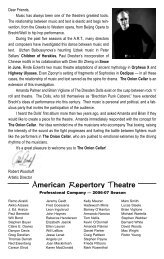Wings of Desire Program - American Repertory Theater
Wings of Desire Program - American Repertory Theater
Wings of Desire Program - American Repertory Theater
You also want an ePaper? Increase the reach of your titles
YUMPU automatically turns print PDFs into web optimized ePapers that Google loves.
“Away with the world behind the world!”by Dirkje HoutmanAngels play a crucial role in Ola Mafaalani’s theatre. They wander the stage in the periphery <strong>of</strong>the action, while love is <strong>of</strong>ten defeated by violence and human helplessness. The angels areobservers, demonstrating compassion and sometimes imitating the violent habits <strong>of</strong> human beings.The number <strong>of</strong> lives lost in Mafaalani’s productions is high, but the dead never disappear by exitingthe stage. They stay in view, hanging out at a bar or, as in her Romeo and Juliet (ToneelgroepAmsterdam, 2004), finding a new place behind a white paper wall that was slowly besmeared withblack paint, and becoming visible when a raging Romeo tore down the paper. There, at the back <strong>of</strong>the stage, the dead can “live on,” observing us, the living, but no longer accompanying us. With bruteforce they are thrown out <strong>of</strong> time, and now they populate the world behind the world. In the context<strong>of</strong> our tormented existence, this eternity takes on an almost positive turn. But the worlds <strong>of</strong> the deadand the living stay separate; two different stories, told apart from each other.In <strong>Wings</strong> <strong>of</strong> <strong>Desire</strong> we see the start <strong>of</strong> a new movement in Mafaalani’s work. For the first timeangels are performing the lead roles, and the two distinct worlds find each other. In this new theatricalorder, events, memories, dreams, and personal histories are cherished and function as the pillars<strong>of</strong> stories that we’re losing in these hectic times <strong>of</strong> hype and confusion. The angels Damiel andCassiel are immortal and have existed from the beginning <strong>of</strong> time. They observe, imitate, and consolepeople; they have a sharp eye for details and record major historical events, from the origins <strong>of</strong>man till the most recent wars. They know history and its stories great and small, as does Homer, theimmortal poet who wanders the stage and teaches the audiences that people need stories to survive.But Damiel doesn’t want to observe any longer; he yearns to experience reality, to feel a weight onhis shoulders that will make him “earthbound,” as he puts it. He longs to gain a history, to conquera story <strong>of</strong> his own. To stand in time. To live now. The instant he falls in love, this desire growsstronger. The girl, Marion, is a trapeze artist, who challenges gravity with her aerobatics, even at therisk <strong>of</strong> breaking her neck. For her, but also for the ultimate sensation <strong>of</strong> life, Damiel will exchangeeternity for mortality.In this fusion between anangel and a human being, anew story will be born, perhapsthe start <strong>of</strong> a brand new historythat encloses a seed <strong>of</strong> hope.In the worlds <strong>of</strong> Marion in herfinal declaration <strong>of</strong> love toDamiel: “There is no greaterstory than ours, <strong>of</strong> man andwoman. It will be a story <strong>of</strong>giants, invisible, infectious, astory <strong>of</strong> new ancestors.”Dirkje Houtman is thedramaturg at ToneelgroepAmsterdam.The Victory Column topped by the statue <strong>of</strong> the Angelat the Grosser Stern.



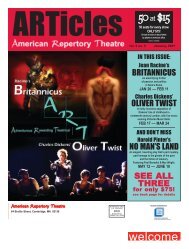
![Wild Swans Program [pdf] - American Repertory Theater](https://img.yumpu.com/49339866/1/167x260/wild-swans-program-pdf-american-repertory-theater.jpg?quality=85)
![Press Release: Trojan Barbie [pdf] - American Repertory Theater](https://img.yumpu.com/47571290/1/190x245/press-release-trojan-barbie-pdf-american-repertory-theater.jpg?quality=85)
![Articles issue as 4_2 [pdf] - American Repertory Theater](https://img.yumpu.com/45053160/1/190x249/articles-issue-as-4-2-pdf-american-repertory-theater.jpg?quality=85)
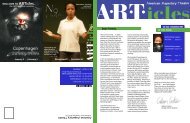
![Three Pianos Program [pdf] - American Repertory Theater](https://img.yumpu.com/41616353/1/167x260/three-pianos-program-pdf-american-repertory-theater.jpg?quality=85)
![Three Sisters [pdf] - American Repertory Theater](https://img.yumpu.com/40969361/1/190x245/three-sisters-pdf-american-repertory-theater.jpg?quality=85)

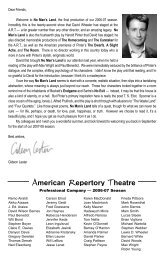
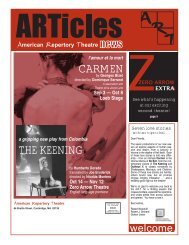
![Program: Sleep No More [pdf] - American Repertory Theater](https://img.yumpu.com/24629394/1/167x260/program-sleep-no-more-pdf-american-repertory-theater.jpg?quality=85)
![Porgy and Bess Program [pdf] - American Repertory Theater](https://img.yumpu.com/24481101/1/167x260/porgy-and-bess-program-pdf-american-repertory-theater.jpg?quality=85)
![Program: Carmen [pdf] - American Repertory Theater](https://img.yumpu.com/24481072/1/190x245/program-carmen-pdf-american-repertory-theater.jpg?quality=85)
